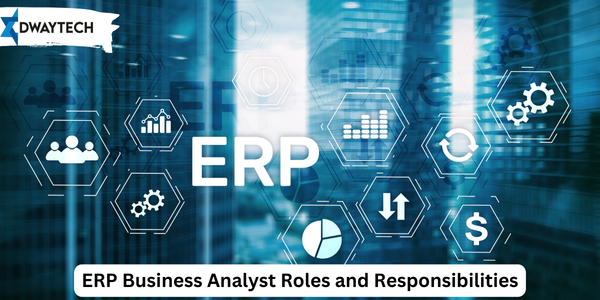In today’s fast-paced business environment, the role of an ERP (Enterprise Resource Planning) Business Analyst is more crucial than ever. These professionals are the linchpin in integrating various business processes and systems, ensuring seamless operations and strategic growth.
In this blog post, we’ll delve into the key roles and responsibilities of an ERP Business Analyst, highlighting why their role is indispensable in modern enterprises.
What is an ERP Business Analyst?
An ERP Business Analyst is a specialist who analyzes and improves an organization’s ERP system. They work closely with stakeholders to understand business requirements, design solutions, and implement ERP systems that streamline operations, enhance productivity, and drive business efficiency.
Key Responsibilities of an ERP Business Analyst
1. Requirement Gathering and Analysis
At the core of an ERP Business Analyst’s role is the ability to gather and analyze requirements. This involves:
- Stakeholder Engagement: Collaborating with stakeholders from various departments to understand their needs and challenges.
- Documentation: Creating detailed requirement documents that outline business processes and objectives.
- Analysis: Evaluating the feasibility of requirements and translating them into functional specifications.
2. System Design and Configuration
ERP Business Analysts play a pivotal role in designing and configuring ERP systems:
- Process Mapping: Mapping out current business processes and designing future state processes that align with organizational goals.
- Configuration: Configuring the ERP system to meet business requirements, ensuring it supports optimized workflows and data integrity.
- Customization: Identifying areas where custom solutions are needed and working with developers to implement these customizations.
3. Project Management
Effective project management is crucial in ERP implementation:
- Planning and Scheduling: Developing project plans, timelines, and resource allocation strategies.
- Risk Management: Risk management is the process of detecting possible hazards and creating plans to reduce them to guarantee project success.
- Communication: Keeping stakeholders informed about project progress and any issues that arise.
4. Testing and Quality Assurance
Ensuring the ERP system functions correctly is a key responsibility:
- Test Planning: Creating comprehensive test plans to cover all aspects of the ERP system.
- Execution: Conducting system testing, user acceptance testing (UAT), and performance testing.
- Issue Resolution: Identifying and resolving defects and issues during testing phases.
5. Training and Support
User adoption is critical to ERP success, and training plays a vital role:
- Training Programs: creating and executing end-user training initiatives.
- Documentation: Creating user manuals, training materials, and support documentation.
- Ongoing Support: Providing ongoing support to users post-implementation to ensure smooth operations.
6. Continuous Improvement
ERP systems need to evolve with the business:
- Performance Monitoring: Continuously monitoring the system’s performance and identifying areas for improvement.
- Upgrades and Enhancements: Planning and managing system upgrades and enhancements to align the ERP system with business needs.
- Feedback Loop: Establishing a feedback loop with users to gather insights and make informed decisions on system improvements.
Why ERP Business Analysts are Indispensable
ERP Business Analysts bridge the gap between business needs and technical solutions. Their ability to understand both the business and technical aspects of ERP systems makes them invaluable in the:
- Enhancing Efficiency: By optimizing business processes and systems.
- Driving Innovation: Through the implementation of cutting-edge ERP solutions.
- Ensuring Success: By managing ERP projects effectively and ensuring user adoption.
Conclusion
The role of an ERP Business Analyst is multifaceted and critical to the success of ERP implementations. Their expertise in requirement gathering, system design, project management, testing, training, and continuous improvement ensures that businesses can leverage their ERP systems to achieve strategic goals and maintain a competitive edge.
Whether you’re considering a career as an ERP Business Analyst or looking to hire one for your organization, understanding these roles and responsibilities is essential to harnessing the full potential of ERP systems.
For more insights on ERP systems and business analysis, stay tuned to our blog!
FAQ’s
1. What is an ERP Business Analyst?
An ERP Business Analyst is a professional who analyzes and improves an organization’s ERP system, ensuring it aligns with business processes and goals. They work with stakeholders to gather requirements, design solutions, and implement ERP systems.
2. What are the primary responsibilities of an ERP Business Analyst?
The primary responsibilities include requirement gathering and analysis, system design and configuration, project management, testing and quality assurance, training and support, and continuous improvement of the ERP system.
3. Why is requirement gathering important for an ERP Business Analyst?
Requirement gathering is crucial because it helps understand the needs and challenges of various stakeholders. This understanding is essential for designing and implementing an ERP system that meets business objectives and improves efficiency.
4. How does an ERP Business Analyst contribute to system design and configuration?
An ERP Business Analyst maps out current and future state business processes, configures the ERP system to support optimized workflows, and identifies areas for custom solutions. They work closely with developers to implement necessary customizations.
5. What project management skills are essential for an ERP Business Analyst?
Key project management skills include planning and scheduling, risk management, and effective communication with stakeholders. These skills ensure the successful implementation of ERP projects.
Also, Useful Links:
Business Analyst Training Course Online Request Demo











